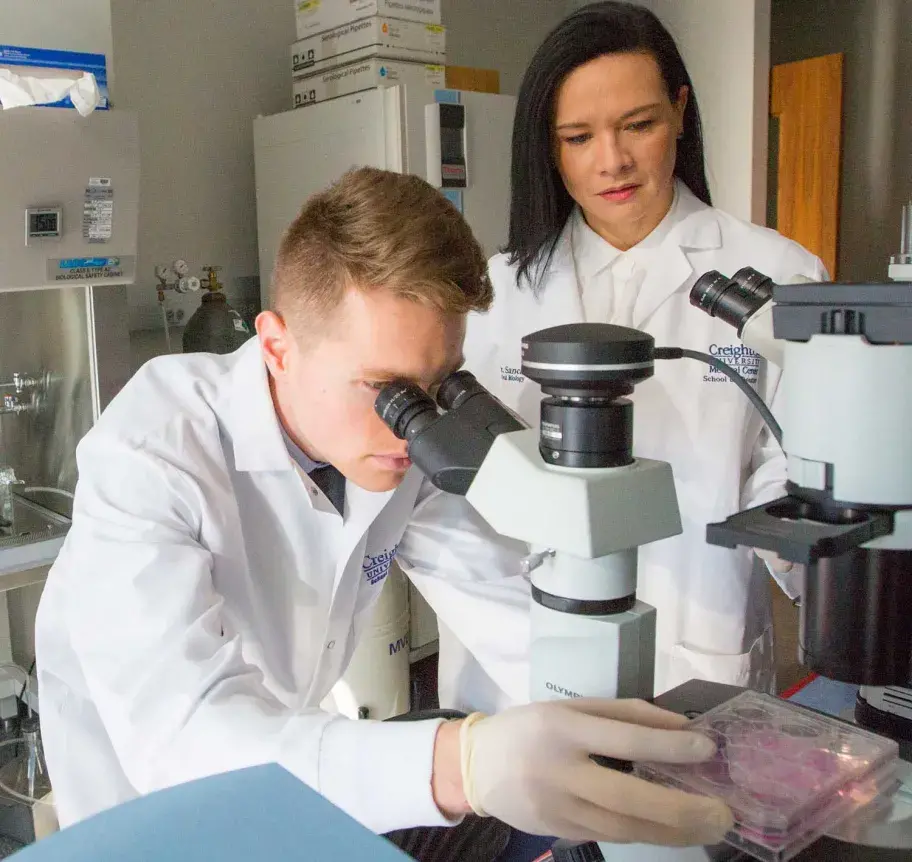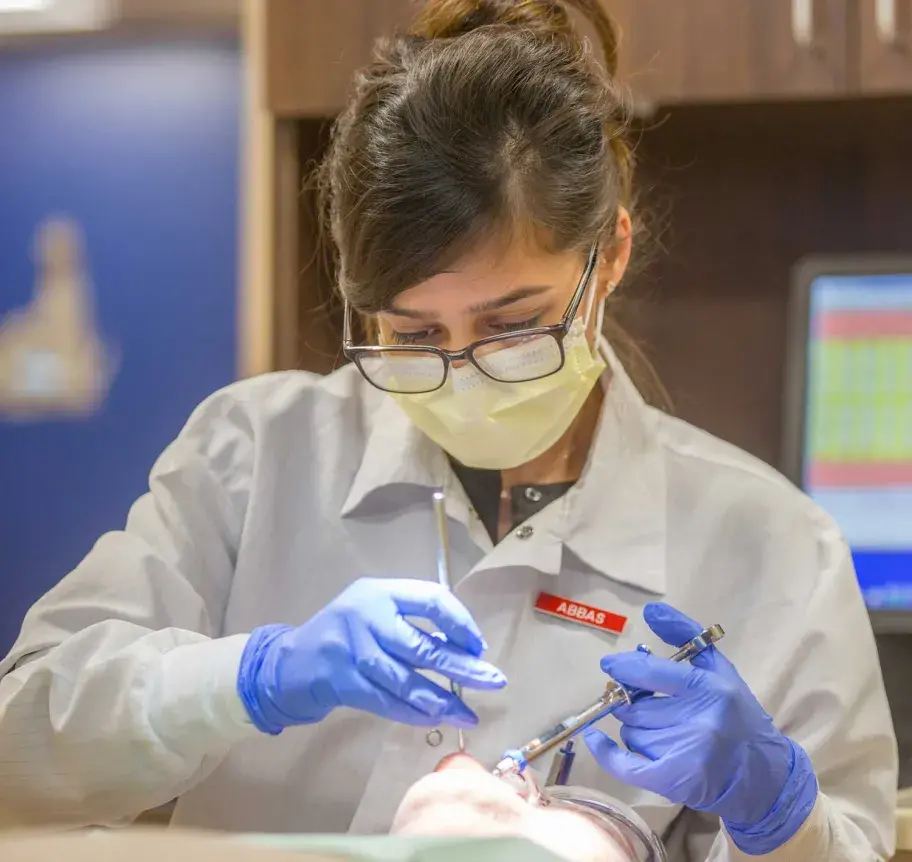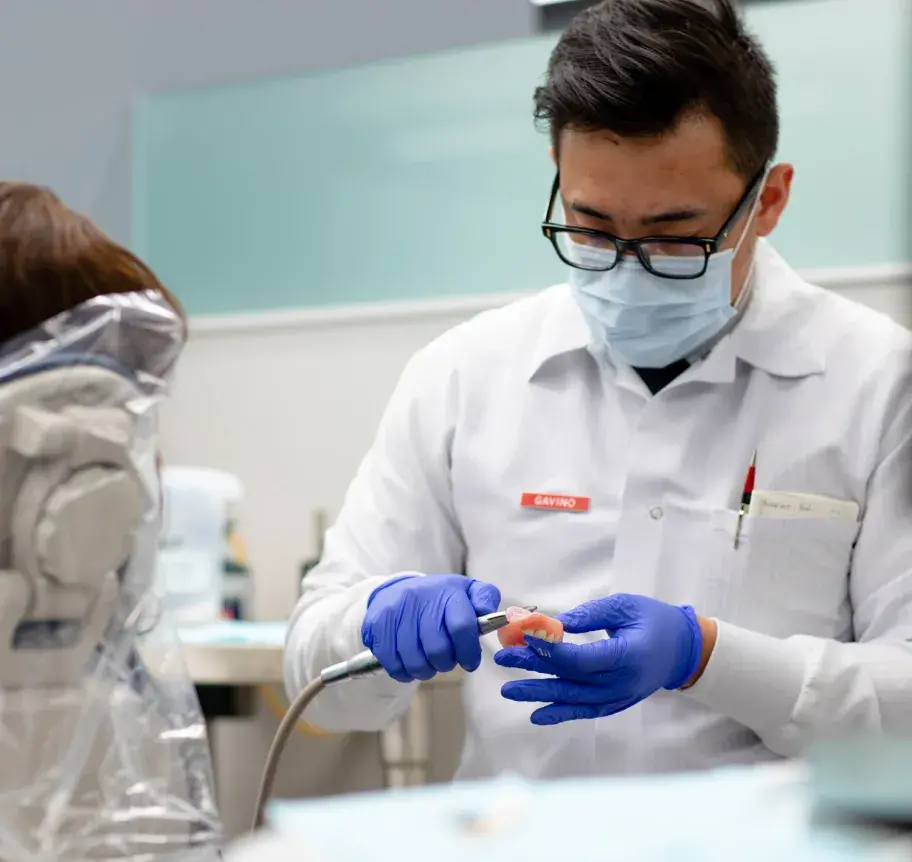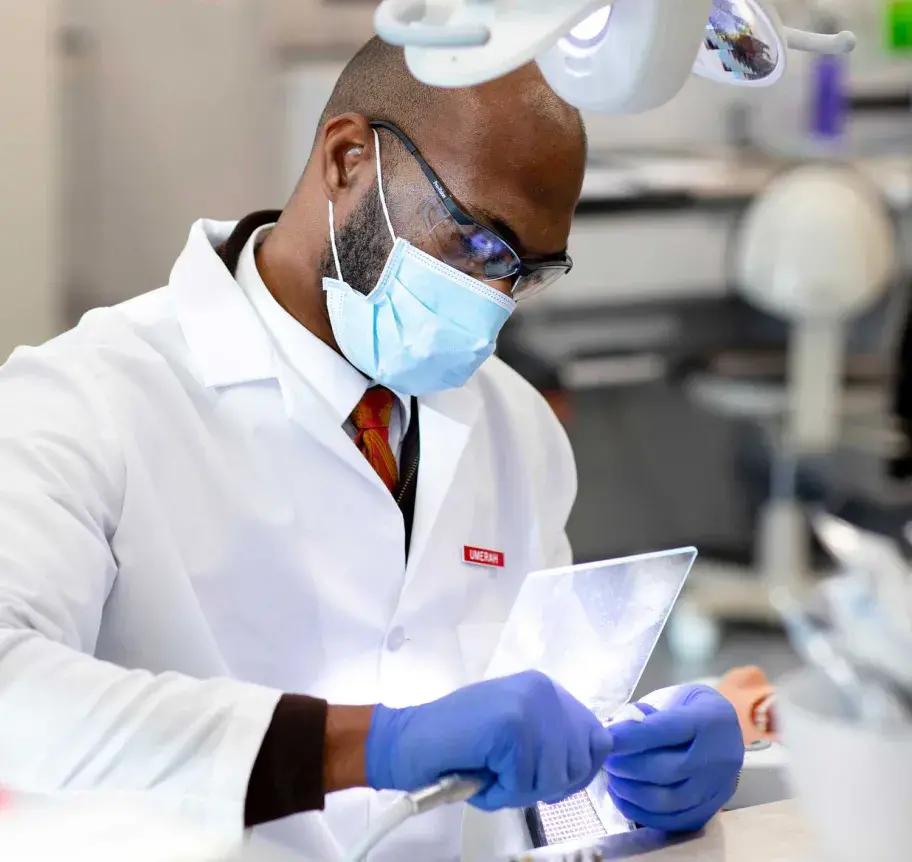
Dentistry (Doctor of Dental Surgery)
Creighton’s renowned doctor of dental surgery program will help you become an excellent dentist, while preparing you to work for the greater good. With our attentive and expert faculty, outstanding clinical experiences and an emphasis on giving back to the community through meaningful service, the School of Dentistry provides a rich preparation for a career in dentistry.
You’ll learn in our state-of-the-art dentistry building filled with new technology such as high tech simulation stations and advanced digital scanning. It also houses Creighton’s dental clinic, which serves the Omaha community. Our DDS degree program will help you become practice ready and expose you to diverse patients as well as peers.
Program Details
In Creighton’s dentistry program, you’ll learn:
- To be a top-rate diagnostician
- How to manage all phases of comprehensive dental care with confidence
- How to manage pain and maximize your calming influence on patients
- How to communicate professionally in both oral and written forms
- How to embrace new technology and discover how it can enhance your ability to treat your patients
- How serving others can enrich your professional life and improve the health of your community
Curriculum
See below for a year-by-year breakdown of the DDS curriculum.
Freshman Year
- Behavioral Sciences
- Community and Preventive Dentistry
- CPR
- Dental Anatomy
- Dental Materials
- Diagnosis/Radiology
- General/Head and Neck Anatomy
- Histology and Embryology
- Introduction to Conducting Research
- Nutrition
- Occlusion
- Physiology
- Periodontology
Total number of hours: 92
Sophomore Year
- Biochemistry
- Diagnosis and Radiology
- Endodontics
- Fixed Prosthodontics
- Infection Control
- Operative Dentistry
- Oral Hygiene
- Pain Control
- Pathology
- Pedodontics-Orthodontics
- Periodontology
- Microbiology
- Information Technology
- Removable Prosthodontics
Total number of hours: 114
Junior Year
- Acute Care
- CPR
- Community and Preventive Dentistry
- Diagnosis and Radiology
- Endodontics
- Fixed Prosthodontics
- Operative Dentistry
- Medically Compromised Patient
- Oral Surgery/Medical Emergencies
- Clinic Activity
- Pedodontics-Orthodontics
- Periodontology
- Pharmacology
- Practice Management
- Removable Prosthodontics
- Evidence-based Dentistry
- TMD Disorders
- Behavioral Science
- Clinical Assessment
Total number of hours: 122
Senior Year
- Acute Care
- Behavioral Sciences/Ethics
- Community and Preventive
- Diagnosis and Radiology
- Endodontics
- Fixed Prosthodontics
- Implantology
- Operative Dentistry
- Oral Surgery
- Clinic Activity
- Pharmacology
- Pedodontics-Orthodontics
- Periodontology
- Practice Management
- Removable Prosthodontics
- Oral Pathology
- Esthetic Dentistry
- Clinical Assessment
Total number of hours: 101
Professional licensure requirements are determined solely by each state and may change without notice to Creighton. While our information is updated annually, Creighton cannot guarantee continuous accuracy. Current and prospective students can find program-specific PDFs on our Academic Regulations page or consult the appropriate licensing agency in the state where they plan to practice to confirm updated requirements for their program.
Creighton also cannot guarantee that any student will attain state-established licensure or certification in any field or jurisdiction.
Admissions Requirements
For admission to the DDS degree program:
- A bachelor’s degree is not required for acceptance, but it is preferred. We have dental students who have majored in English, foreign languages, political science and sociology. But the majority of accepted applicants have majored in biology, chemistry, physics or zoology.
- By the end of the spring term preceding the fall in which they intend to enter the School of Dentistry, all applicants must have earned at least two years’ worth of credits from an accredited college of arts and sciences. This includes a required 64 semester hours (or 96 quarter hours) in academic courses exclusive of physical education and military science.
Please note that the hours listed for each course should represent a full academic year of study.
All applicants should have earned at least a B average in their college courses. The Admissions Committee pays special attention to grades earned in the predental sciences.
- It is recommended that applicants complete coursework in a series of other upper level courses including Anatomy, Physiology, Microbiology, Genetics, Neuroscience, Immunology, Pharmacology, Molecular Biology, and Histology.
See the full admission requirements for information about shadowing requirements, when to take the Dental Admissions Test, prerequisites, physical requirements, recommendation letters and more.
Dates & Deadlines
We’ve coordinated our application process with the American Dental Education Association’s Application Service (AADSAS) online application service. We encourage you to apply as soon as the application service begins accepting applications on June 1. For more information, visit our admissions page.
Tuition & Scholarship
More than 125 scholarships are awarded to dental students every year, varying in size from $500 to $24,000. There is no separate application for scholarships. They are awarded by the Admissions Committee or the Committee on Scholarship and Financial Aid on the basis of need and merit. Learn more about required information for consumers.
“Each day I attend clinic, I feel that I am caring for my patients' whole person - mind, body and spirit.”
Brenda Huynh
Dental Student
Dentistry is a fast-growing profession with a large and growing patient base. Dentists will continue to see an increase in demand for their services as studies continue to link oral health to overall health.
In some areas of the country where patients have little access to dental care, demand for dental services continues to be high.
After graduating in dentistry, your options may include:
- Private practice
- Continuing on to a specialty program
- Work at a community health center
- A career in military dentistry
Approximately 1 in 4 graduates of the School of Dentistry continue on to earn a specialty degree.
Creighton University School of Dentistry is nationally recognized for academic and clinical excellence. The school conducts research across the spectrum of social needs, including:
- Basic science of discovery
- Research to improve healthcare delivery models and care of the underserved
- Educational and clinical research
Numerous active clinical trials focus on advancing the quality and safety of dental materials and techniques. Additionally, several in vitro projects are underway. The results of these investigations provide valuable information that can be applied to clinical teaching situations and patient care.
Dental students are engaged in research early in their academic career, participating in research projects as part of course requirements, and they are invited to participate in faculty research projects.
Many present research projects meetings and publish findings in scientific journals.
American Student Dental Association (ASDA)
- The local chapter of the ASDA promotes active participation of undergraduate dental students in their own dental organizations. As a result, students are better prepared to assume a professional role after graduation. Membership is voluntary for all undergraduate dental students and includes privileges of attending all dental meetings of the local, state and national organization.
Student National Dental Association (SNDA)
- The Creighton chapter of the SNDA is an active group committed to public service and community involvement. CUSNDA:
- Promotes public awareness of issues such as oral cancer
- Creates mentorship opportunities
- Fosters relationships with the local community to provide oral health education and screening to underserved populations
- Provides opportunities to attend conferences and seminars at the local and national level










